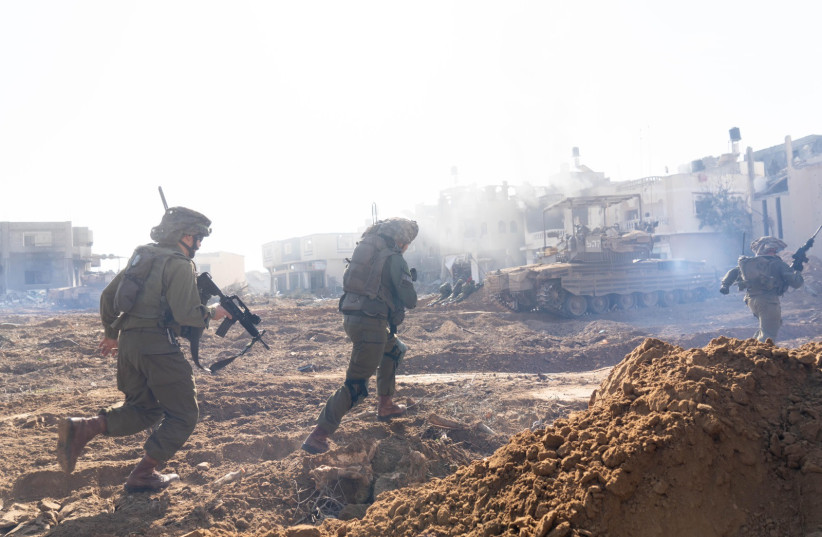The IDF on Tuesday continued its new, major division-level push in western Khan Yunis, which it had started on Monday, maintaining the most intense fighting since early December, when the military first entered other parts of Hamas’s southern capital.
Combined between Monday and Tuesday, over 100 Hamas terrorists have already been killed in larger-than-usual organized battles, with around 50 Hamas fighters killed on Monday and a similar number on Tuesday.
There were no signs that the incident in central Gaza on Monday, in which 21 IDF soldiers were killed, was having any direct impact on the ongoing Khan Yunis attack.
On Monday, Division 98 unleashed serious forces from its seven brigades, artillery, tanks, and air support and surrounded western Khan Yunis, which, until now, the IDF had mostly steered clear of.
On Tuesday, the IDF said it had killed several ambush units with rocket-propelled grenade launchers and anti-tank missiles, as well as several Hamas forces in extremely close-range fighting.

Also on Tuesday, the IDF found the largest strategic tunnel yet discovered in southern Gaza, with a length of one and a half kilometers. The military’s takeover of the tunnel and the manufacturing facilities relating to the tunnel network is expected to significantly harm any future potential Hamas rocket attacks from southern Gaza.
IDF expanding military operations
The IDF’s message early Monday morning about large amounts of airstrikes was in preparation to give the ground forces an easier time moving into the new areas. For the last seven weeks, IDF attacks on Khan Yunis had focused on the northern and eastern portions of the city.
On both days, the IDF called western Khan Yunis the heart of Hamas’s operations in Gaza, including areas where its top two leaders, Yahya Sinwar and Muhammad Deif, grew up.
Further, the IDF said that it recognizes that this part of Khan Yunis is the most dense area in the city in terms of having less room to maneuver and a larger number of civilians and sensitive sites, including hospitals.
It said that it had learned many lessons from dealing with parallel issues in northern Gaza while also noting some critical differences unique to southern Gaza.
The IDF hopes this new push will break the ability of the Khan Yunis Brigade to continue fighting as an organized force. However, there are still no immediate plans to enter Rafah or take control of the Philadelphi Corridor.
Also, the IDF did not say anything specific about a lead toward Hamas’s leadership or the hostages. Multiple officials expressed hope that the new push would bring Hamas closer to cutting a new hostage deal.
In the North, the IDF issued a mysterious and unusual statement that it had struck a “military asset” in Lebanon connected not only to Hezbollah but also to Iran.
The message included no details, such that it was unclear why it was being made public at all, given the risk of retaliation by the Islamic Republic.
This came after the IDF had already announced that infrastructure at an IAF base on Mount Meron had been damaged by around a dozen rockets fired by Hezbollah from Lebanon into Israel.
IDF sources said that the damage was much more minor, like that done to the IDF’s Northern Command earlier in January, and much less severe than the real damage done to the same IDF air force base earlier this month.
Also, the IDF said that it had learned lessons from the earlier attack on the base at Mount Meron and had managed to fire off an interceptor to strike aspects of the rockets fired by Hezbollah, reducing the harm they could cause.
IDF Chief Spokesman Brig. Gen. Daniel Hagari said that the damage was fixed within hours.
Some of Hezbollah’s attacks also damaged electrical infrastructure relating to civilians in the North and temporarily disrupted access to electricity.
Earlier, the IAF carried out airstrikes in the town of Rumin in southern Lebanon, the Lebanese, Hezbollah-affiliated Al-Mayadeen network reported on Tuesday.
Jerusalem Post staff contributed to this story
